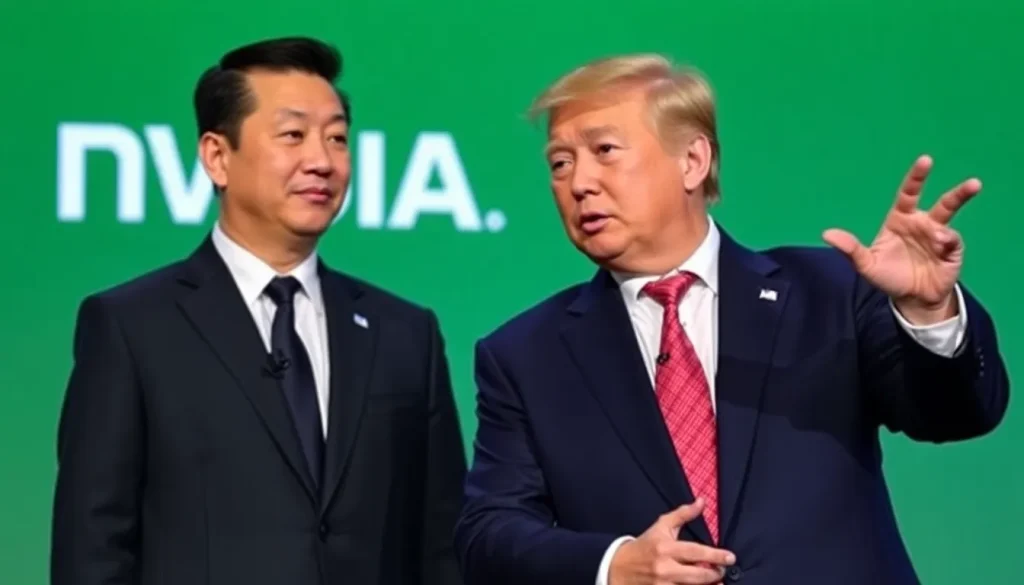China challenges NVIDIA and Trump by accusing company of antitrust violations

The ongoing technological rivalry between the United States and China has taken a new turn, putting NVIDIA, a leading player in the semiconductor industry, at the center of scrutiny. As geopolitical tensions rise, the recent accusations against NVIDIA by the Chinese government highlight the complexities of international trade and antitrust laws. In this article, we delve into the implications of these allegations, the historical context of similar cases, and what this could mean for the future of U.S.-China relations.
China's Allegations Against NVIDIA: A Look into Antitrust Laws
China's State Administration for Market Regulation (SAMR) has officially accused NVIDIA of violating antitrust laws by failing to adhere to commitments made during its acquisition of Mellanox in 2019. The allegations suggest that NVIDIA may have engaged in practices that could compel customers to purchase Mellanox networking products alongside its GPUs, a tactic deemed illegal as it restricts competition.
If the allegations are substantiated, NVIDIA could face fines amounting to up to 10% of its previous year's sales, which translates to approximately $1.71 billion. However, the Chinese legal framework allows for even stiffer penalties if the violations are categorized as serious. NVIDIA has publicly defended its actions, asserting:
"Our products are best in class, and this is well established. We support industry open standards, allowing our partners and customers to use our products across a broad range of areas."
This situation is not new. China has previously employed antitrust investigations as a means of exerting pressure in commercial disputes, with companies like Alphabet (Google) facing similar scrutiny in the past. Currently, NVIDIA, which derives about 13% of its total sales from China, finds itself under the microscope amid a booming demand for AI chips driven by major players like Tencent and ByteDance.
The Broader Implications of the Investigation
The timing of this investigation is particularly significant. As the U.S. and China engage in discussions over trade policies, the semiconductor sector remains a focal point. NVIDIA's status as a bargaining chip in the trade war highlights the intricate relationship between technology and international diplomacy.
Experts suggest that this investigation could have far-reaching consequences, impacting future negotiations between the two countries. The findings of the SAMR might influence how the U.S. approaches concessions in trade talks, particularly concerning technology exports.
- Possible repercussions for NVIDIA’s market share in China.
- Implications for U.S.-China trade negotiations.
- Potential shifts in strategic alliances among tech companies.
NVIDIA's Strategies and Challenges in China
Jensen Huang, NVIDIA's CEO, has made considerable efforts to strengthen the company's presence in China, including multiple trips to establish commercial ties. In fact, NVIDIA even designed a special GPU, the H20, aimed at the Chinese market, although its export faced regulatory hurdles. Despite these efforts, the political landscape proves challenging, overshadowing Huang’s personal initiatives.
Market analysts like Zhengyuan Bo from Plenum have pointed out the implications of these developments:
"This serves as a warning that if the U.S. export control paradigm continues as it has in recent years, there will be consequences, and China is ready to impact U.S. companies."
Another critical insight comes from Ray Wang of Futurum Group, who emphasizes the potential dangers if China decides to restrict access to Mellanox's networking solutions:
"The real concern is whether China will impose new measures that limit NVIDIA’s ability to sell networking solutions to Chinese customers."
Historical Context: Similar Cases in the Tech Industry
China's use of antitrust investigations as leverage is not unprecedented. In 2015, Qualcomm faced a hefty fine exceeding 6 billion yuan for similar violations. This case serves as a potential precedent for NVIDIA, particularly given the substantial revenue the company generates from the Chinese market, which exceeded $17 billion in 2025.
These historical instances illustrate a pattern of behavior where regulatory scrutiny is often wielded as a tool in broader commercial conflicts. Key takeaways from these cases include:
- The potential for substantial financial penalties.
- Effects on the company's reputation and market position.
- Implications for international trade relations.
Future Prospects: What Lies Ahead for NVIDIA and U.S.-China Relations
The outcome of the investigation into NVIDIA will likely play a crucial role in shaping the future of its operations within China. If the SAMR finds the company guilty of antitrust violations, the penalties could significantly impact NVIDIA’s business strategy.
Moreover, this situation adds another layer of complexity to the already strained U.S.-China relations. With former President Trump having previously threatened tariffs on Chinese imports that could affect NVIDIA and AMD, the stakes are high for both parties.
In light of these developments, observers are keenly watching for any response from the U.S government, especially as the commercial landscape continues to evolve rapidly. One pertinent question arises:
- How will the U.S. adapt its trade policies in response to the findings of this investigation?
- What measures will NVIDIA implement to safeguard its interests in China?
As the situation unfolds, it remains to be seen how both NVIDIA and the U.S. government will navigate these turbulent waters. The ramifications of this investigation could set a significant precedent, influencing how multinational corporations engage with regulatory environments in foreign markets.
For more insights on this escalating rivalry, check out the following video that delves deeper into the implications for NVIDIA and the broader tech industry:




Leave a Reply